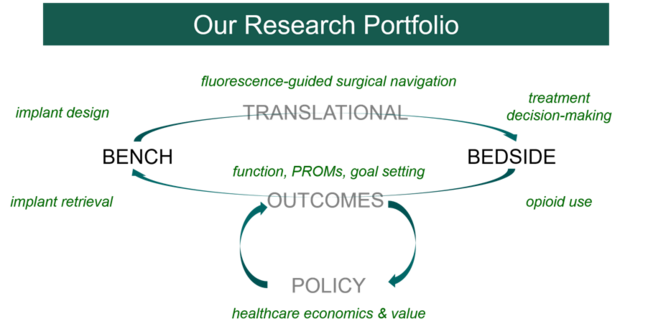Fluorescence-guided surgery
Safe and effective surgery accomplishes the required intervention, leaving the patient with the minimum necessary morbidity. To accomplish this goal, surgeons must distinguish between tissue types, preserving those of high value. Standard white-light visualization is often adequate to guide surgery in normal anatomy, however, in the setting of trauma, tumors, prior surgery, congenital anomalies, and radiation therapy, normal anatomy may be difficult to recognize. Additionally, positive identification of important tissues during minimally invasive surgery can be challenging due to the reliance on anatomical landmarks that are inconsistent across patients. Fluorescence-guided surgery (FGS) is a nascent form of surgical navigation that seeks to increase the safety and efficacy of surgery through enhanced recognition of important anatomical structures using tissue and disease-specific fluorophores. We are pursuing this work in order to identify cancers, infections, and important non-pathological tissues such as nerves.
Epidemiology, health policy, evidence-based medicine, shared decision-making
We have a longstanding history of collaboration with the nationally renowned Dartmouth Institute of Health Policy and Clinical Practice. This database allows us access to over 50 million records related to the Medicare population. Using this database, Dr. Weinstein and colleagues at The Dartmouth Institute published the first Dartmouth Atlas of Musculoskeletal Health Care. Dr. John-Erik Bell heads our Medicare Claims Unit, through which faculty and residents can continue to pursue research related to the entire U.S. population.
Center for Shared Decision Making
Another resource is the Center for Shared Decision Making, the founding director of which was Dr. Weinstein. This center now provides programs not just for orthopaedics but for many other disciplines and disease areas, and is a rich source of data on patient decision-making and interactions with the health care system.
Clinical Trials Office
The Clinical Trials Office at Dartmouth Hitchcock Medical Center is a collaborative endeavor meant to boost synergy amongst colleagues, residents included. It is a multidisciplinary collection of experienced researchers dedicated to the development and support of complex clinical research, especially clinical trials. It seeks to enrich the local research environment by providing essential expertise for the design, analysis, and administration of current and future trials.
Biomechanics and Bioengineering
Housed at Dartmouth's Thayer School of Engineering, Dr. Douglas Van Citters (Thayer School of Engineering), Dr. John Collier (Myron Tribus Professor of Engineering, Thayer School of Engineering) and Michael Mayor (William N. and Bessie Allyn Professor emeritus of Orthopaedics) run the Dartmouth Biomedical Engineering Center for Orthopaedics (DBEC), the world's foremost total joint implant retrieval lab. Over the last 30 years DBEC has examined over 7,000 orthopaedic implants sent to them by more than 1,000 surgeons, examining wear patterns of component materials and structures. Current projects are focused on oxidation differences between in vivo and shelf-aged components, and between component materials; the development of an accelerated aging environment; and modeling oxidative degradation of polyethylene. Research opportunities abound for our residents with new opportunities in prosthesis design methodology and biomaterials, as well as exposure to biomechanical testing of devices.
The Center for Surgical Innovation
Surgeons are too often limited by what they cannot see—anatomy that is difficult to reach or diseases that are not visible to the naked eye. While advances in imaging before and during surgery have revolutionized countless surgical procedures, tremendous opportunities for surgical innovation remain. A primary constraint is the lack of operating room time and space for research purposes. At Dartmouth Hitchcock Medical Center, the Center for Surgical Innovation (CSI) removes that constraint. Dedicated to translational research, the CSI is equipped with MRI and CT machines that can move in and out of 2 spacious operating rooms. This allows surgeons and engineers to rapidly develop, test and validate new surgical tools and techniques, with the goal of advancing better, safer and, in some cases, less costly care for patients everywhere.
Infrastructure
- Biostatistical support (Paul Werth, PhD and Adriana Lucas, MS)
- Orthopaedics department with >25 faculty physicians
- Research coordinators
- Research Governance Committee (Dr. Kevin McGuire, MD, MS)
Collaborators within the Dartmouth community:
- Dartmouth College
- Thayer Engineering School: Largest implant retrieval lab in the US, emphasis on biomechanics and fluorescence-guided surgery
- The Dartmouth Institute: Focus on value-based healthcare, cost-effectiveness
- Tuck School of Business
